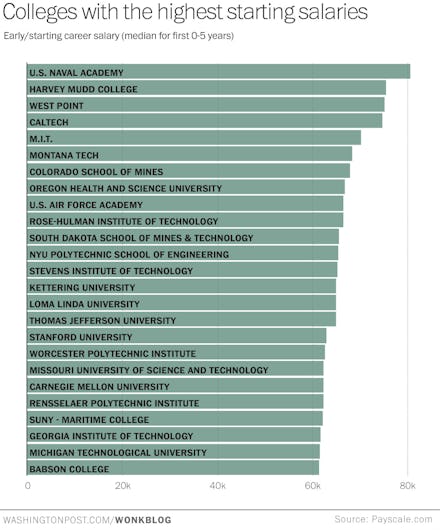To Make the Highest Salary Out of College, Don't Go to an Ivy League School

It's only September, but for newly minted high school seniors, college season has already started, and there's one important question on everyone's mind: Which college gives the best bang for the buck?
While more American students are applying to more colleges than ever, the prospect of job security after college graduation doesn't look so good, with 44% of recent grads working jobs that don't require their bachelor's degrees, and 8.5% facing unemployment. Given these depressing statistics, it only makes sense for young people to consider which majors and professions translate into profitable careers in the long run.
And though there are some schools that offer questionable returns for investment in their education, there are others that offer distinctive advantages in the job market. According to the Washington Post reporter Roberto Ferdman's fantastic analysis of data employment firm PayScale, the schools below have alumni with the highest average starting salary — and the list looks very different from the U.S. News & World Report's annual college rankings.
Instead of privileging institutional reputation, financial resources and selective studies, such as the U.S News & World Report ranking, the PayScale list offers a cold, hard look at how well-prepared students at each school are when they enter the job market. Notice the glaring lack of Ivy League schools and other traditionally touted colleges. Instead, military schools and tech institutes are well-represented.
According to Ferdman's analysis, the picture looks slightly different when you compare mid-career salaries from alumni:
While there is better representation from the Ivies on this list, the takeaway is clear: Students at military schools and tech institutes still have the best shot for high-paying careers.
And that's an important reality that prospective applicants need to keep in mind. While prestigious schools may look attractive on the page, college tuition is an expensive burden — and you need to be careful about where you make the investment.